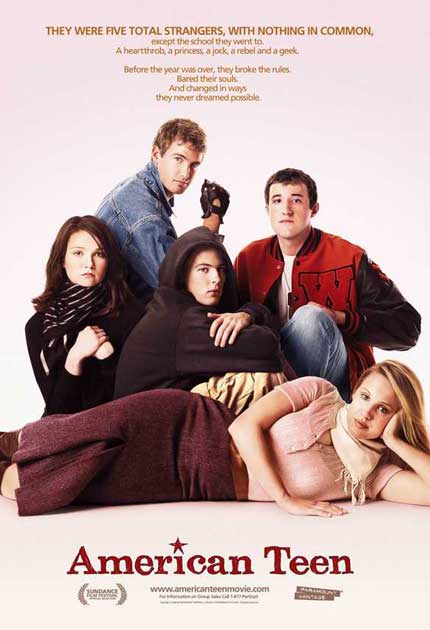American Teen: The real brat pack
Geeks, jocks and prom queens – we may think we know about American high schools, but a new documentary reveals the truth behind the clichés

In the old days, before Disney came along with its sugar-coated young stars in the High School Musical franchise, Hollywood liked to unpick adolescent hearts, minds and wallets with a warts-and-all genre of film known as the "teen movie". From The Breakfast Club to American Pie by way of Napoleon Dynamite, Clueless, Ferris Bueller and, er, Not Another Teen Movie, a generation of popcorn-chomping youth was weaned on cultish flicks about the cruel caste system that underpinned their day-to-day existence.
In teen-movie world, high-school students are defined by membership of one of five distinct tribes. Boys can be "jocks" (the sporty ones) or "heart-throbs" (the good-looking ones). Girls can be "princesses" (the pretty ones). Both sexes can be "geeks". Anyone else is a "misfit".
This weekend, UK cinema-goers will be treated to the latest addition to this rich genre with the release of American Teen, a documentary dedicated to reminding viewers of the unfortunate fact that The Breakfast Club and its myriad descendants are a straightforward collision between life and art. The film, a sensation at last year's Sundance Film Festival, follows five students over the course of an academic year at a high school in Warsaw, a nowhere town (population 12,000) in an unlovely corner of northern Indiana.
Its director, Nanette Burstein, who was nominated for an Oscar for her 1999 boxing documentary On the Ropes, selected her subjects by interviewing the entire senior year of Warsaw Community High. She filmed 1,000 hours of footage of their everyday lives in an attempt to showcase the reality of high-school archetypes. So we have the "princess" – a blonde, popular, somewhat pampered student council vice-president called Megan Krizmanich, whose occasional thoughtlessness turns her into the villain of the piece. Colin Clemens is "the jock", the star of the basketball team desperately trying for a sports scholarship to college. Mitch Reinholt is the "heart-throb". Jack Tusing is the "geek": a computer-obsessed martyr to acne who's preoccupied with getting a girlfriend. Hannah Bailey, the nearest thing the film has to a tragic heroine, is the "misfit". (Their roles are officially outlined on American Teen's website.)
The film's appeal lies in the sometimes touching nature of their narratives, which offer a troubling window on to middle America. The twist, of course, is that they are all real people.
Megan, for example, is under intense pressure to secure a place at Notre Dame university where all her family have gone except one relative – who, as her parents repeatedly remind her, later committed suicide. Colin is told by his own father that if he fails to secure a sports scholarship he'll be unable to attend college (he is too thick to get an academic scholarship, and too poor to buy his way in) and must instead join the army. Hannah, who suffers the humiliation of being dumped by a boy via text message, retreats to her bedroom for weeks, where she is hectored by a manic-depressive mother who further cripples her self-esteem by telling her she's "not special".
There are displays of breathtaking cruelty. In one scene, Megan and friends mercilessly abuse a girl who made the mistake of text-messaging fruity pictures of herself to an ungallant boyfriend. In another, Jack pounces on a newly arrived female student, who agrees to a series of "dates" before informing him that she has rapidly come to realise that she can do a lot better.
Perhaps most dramatically, Megan's place at Notre Dame is jeopardised after she is hauled before the headmaster for vandalising the home of a student council officer whose idea for the high-school prom – "Welcome to the Jungle" – was deemed more exciting than her own.
American Teen has had a curious journey. It was shot during the 2005/06 academic year, and its sensational debut at Sundance was followed by an all-night bidding war between distributors. It was released in the US last summer, to generally positive reviews. "The fascination comes from how unguarded these young people seem to be about their own lives," noted The New York Times. In New York magazine, David Edelstein said: "The way it has been put together reminds me of those animal shows where the crew nudges the gazelles in the direction of the lions with multiple cameras standing by."

Watch Apple TV+ free for 7 day
New subscribers only. £9.99/mo. after free trial. Plan auto-renews until cancelled.
ADVERTISEMENT. If you sign up to this service we will earn commission. This revenue helps to fund journalism across The Independent.

Watch Apple TV+ free for 7 day
New subscribers only. £9.99/mo. after free trial. Plan auto-renews until cancelled.
ADVERTISEMENT. If you sign up to this service we will earn commission. This revenue helps to fund journalism across The Independent.
Yet the launch was marred by a controversy over allegations (robustly denied by Burstein) that key scenes had been staged. It ended up being screened in just 57 US cinemas, taking a mere $942,000. This weekend's British release represents a last shot at financial success for a film that neatly touches the truth behind high-school existence.
Join our commenting forum
Join thought-provoking conversations, follow other Independent readers and see their replies
Comments
Bookmark popover
Removed from bookmarks